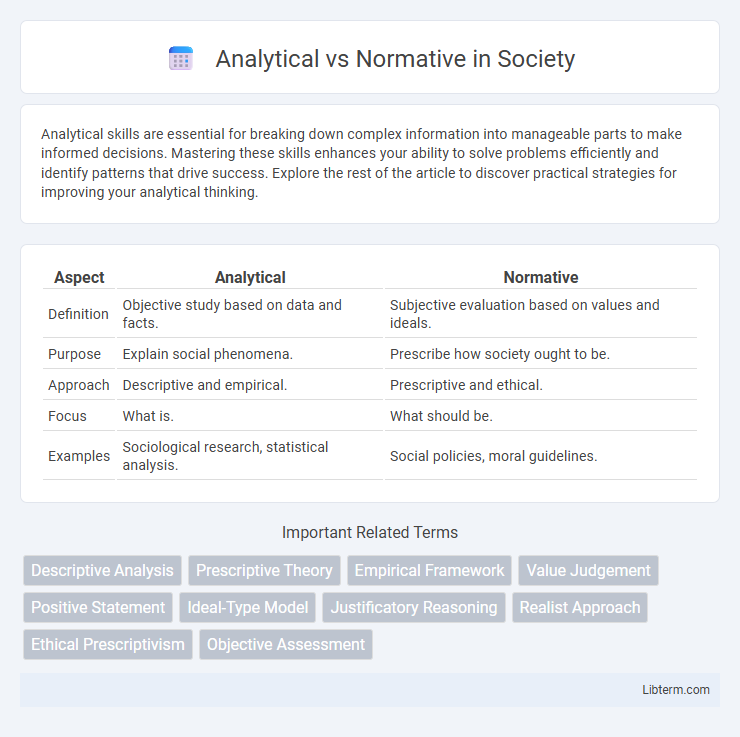Analytical skills are essential for breaking down complex information into manageable parts to make informed decisions. Mastering these skills enhances your ability to solve problems efficiently and identify patterns that drive success. Explore the rest of the article to discover practical strategies for improving your analytical thinking.
Table of Comparison
| Aspect | Analytical | Normative |
|---|---|---|
| Definition | Objective study based on data and facts. | Subjective evaluation based on values and ideals. |
| Purpose | Explain social phenomena. | Prescribe how society ought to be. |
| Approach | Descriptive and empirical. | Prescriptive and ethical. |
| Focus | What is. | What should be. |
| Examples | Sociological research, statistical analysis. | Social policies, moral guidelines. |
Introduction to Analytical and Normative Approaches
Analytical approaches focus on describing and explaining phenomena based on empirical data and logical reasoning, emphasizing objectivity and factual analysis. Normative approaches, on the other hand, deal with value judgments and prescribe how things ought to be, integrating ethical considerations and subjective criteria. Understanding both approaches is essential for comprehensive research, as analytical methods provide evidence-based insights while normative methods guide decision-making based on principles and goals.
Defining Analytical Thinking
Analytical thinking involves systematically breaking down complex information into smaller components to understand relationships and patterns, relying on data, logic, and empirical evidence. It contrasts with normative approaches, which emphasize what ought to be based on values and ethics rather than objective analysis. Defining analytical thinking is essential for disciplines such as science, technology, and policy analysis where evidence-based decision-making is critical.
Understanding Normative Perspectives
Normative perspectives involve evaluating what ought to be done, rooted in values, ethics, and societal ideals, contrasting with analytical approaches that focus on objective facts and descriptive analysis. Understanding normative viewpoints requires examining moral principles and the implications of actions on fairness, justice, and well-being. Emphasizing ethical frameworks within policy-making and decision-making processes enriches the discourse by aligning outcomes with shared human values.
Key Differences Between Analytical and Normative Methods
Analytical methods focus on objective examination and factual data to describe how things are or predict outcomes, relying on empirical evidence and logical reasoning. Normative methods involve value-based judgments and prescribe how things ought to be, incorporating ethical considerations and subjective preferences. The key difference lies in analysis describing reality versus normativity guiding decisions based on ideals or values.
Applications of Analytical Approaches
Analytical approaches are primarily applied in data-driven decision-making, performance measurement, and predictive modeling across various industries such as finance, healthcare, and marketing. These methods utilize statistical analysis, machine learning algorithms, and quantitative techniques to derive insights, optimize operations, and forecast trends. Emphasizing empirical evidence and systematic evaluation, analytical approaches support objective assessment and improve strategic planning.
Importance of Normative Frameworks
Normative frameworks establish essential ethical guidelines and value-based standards that shape decision-making in various fields, ensuring actions align with societal ideals and long-term goals. Unlike analytical approaches that focus on empirical data and objective analysis, normative frameworks prioritize what ought to be done, fostering accountability and moral responsibility. Their importance lies in guiding policy development, legal systems, and organizational behavior toward equitable and just outcomes.
Advantages and Limitations of Analytical Reasoning
Analytical reasoning offers precise problem-solving capabilities by breaking complex information into smaller, manageable parts, which enhances clarity and supports data-driven decisions. Its limitations include potential over-reliance on logic and structured data, which may overlook emotional, ethical, or contextual factors important in normative assessments. While analytical reasoning excels in objective evaluation, it may struggle with ambiguity or subjective values crucial for comprehensive decision-making.
Strengths and Weaknesses of Normative Reasoning
Normative reasoning excels in providing clear ethical guidelines and principles that help shape decision-making by establishing what ought to be done, offering a structured framework for moral and legal standards. Its main strength lies in its ability to guide behavior toward ideals, fostering consistency and accountability in normative judgments. However, its weakness includes potential rigidity and lack of adaptability, as normative reasoning may struggle to accommodate complex, real-world situations where conflicting values or exceptions arise.
Integrating Analytical and Normative Approaches
Integrating analytical and normative approaches enhances decision-making by combining empirical data analysis with value-driven frameworks, ensuring outcomes are both evidence-based and ethically sound. Analytical methods provide objective insights through quantitative models and data interpretation, while normative perspectives introduce principles and societal values that guide goal-setting and policy formulation. This integration fosters comprehensive strategies that balance factual accuracy with moral considerations, optimizing effectiveness and legitimacy in diverse fields such as public policy, economics, and organizational management.
Conclusion: Choosing the Right Approach
Analytical approaches emphasize objective data analysis and factual conclusions, ideal for evidence-based decision-making in business and scientific contexts. Normative approaches prioritize values, ethics, and what ought to be, guiding policy formulation and moral judgments where subjective criteria are essential. Selecting the right approach depends on the context: choose analytical methods for quantifiable problems and normative frameworks for decisions requiring value-based considerations.
Analytical Infographic

 libterm.com
libterm.com